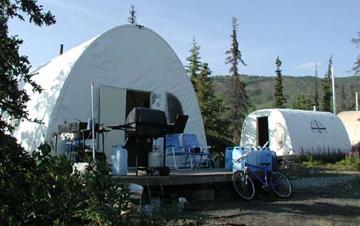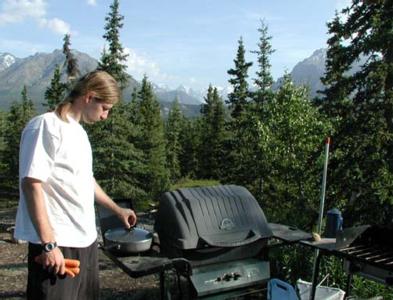4 July, 2000
July 4, 2000
Matanuska Glacier, Alaska
As one turns off the Glenn Highway to go to the glacier, you enter the
property of Glacier Park Resort. The resort is actually just a widely
scattered campground on a large island formed by two meltwater streams
from the glacier. Not far from the road you cross one of the streams and
check into the campground office or “lodge” as they call it here. The
research camp is just a short drive from the office. Further along at
the very end of the gravel road you come to a parking area adjacent to
the terminus of the glacier. The terminus is the very end of a glacier
where the ice ends and the stream begins and there is a wonderful view
of it here.
The research camp is very well equipped for daily life. Outside the
main tent on a deck there is a large gas grill and four propane burners
for cooking. All cooking must be done outside but the view of the
Chugach mountains to the south makes you feel like you’re in a resort.
Inside there are cooking and eating supplies as well as space for
storage of dry food and perishables. Ice is often brought back from the
glacier to keep things nice and cold in the coolers-there are no
refrigerators here. In the morning there’s still a bit of a chill in the
air and the picnic table inside the tent is used for enjoying breakfast.
Once finished I like to head out to the deck to enjoy some coffee as the
sun tries to burn the clouds off the mountains. Lunch or dinner are
taken indoors only if the bugs or weather don’t allow staying out side.
The bugs are not really a big nuisance at all most of the time though.
There is no running water in camp so water is stored in large five
gallon containers which also sit out on the deck for lack of a better
place. We fill the containers at the “lodge” and transport it back to
camp. There is a short trail that takes you to a simple pit toilet. If
you want to have a shower there are two choices. If you can live with
yourself and not be too offensive to others around you, trips are made
to Wasilla just over an hour away every four or five days. While there
the vehicle gets a fill up, new supplies of food are selected and people
and clothes come back looking fresh! There is also a black plastic
bladder in camp that can be filled with water and set on the deck to
warm in the sun. It can then be hooked up for a very short but private
shower. There is a generator for electricity but it is only used when
the use of computers or scientific instruments require it.
And so the camp provides for very pleasant living conditions. I don’t
suppose there’s anything essential that we don’t have here. However, I
do have to take a short ten minute hike to the lodge in order to get my
journals and pictures uploaded as well as take care of my email. But the
walk is very easy and the return trip is especially nice as I am facing
the Chugach Mountains.
Our camp is not far from the terminus of the glacier but generally a
vehicle is taken to get out to a variety of stations on or near the
glacier where work is being conducted. This morning I went out with
Justin to change the sample bottles on one of the ISCO water samplers
(more about those on another day). We then had to head off to Anchorage
to pick up my partner in this project, Ben Burnette. On the return trip
we stopped to pick up a pair of ice crampons which will make walking on
the ice much easier and safer. We hit the grocery again to allow Ben to
pick up some food supplies as well. We have small cooking groups and Ben
and I will cook together at camp. Tonight we grilled some killer fresh
salmon steaks! Tomorrow we will actually get started with some of our
project. Till then.....
Marvin Giesting

This is the largest of the shelters and sitting on the deck or cooking on the grill is usually accompanied by great views of the Chugach Mountains just across the Matanuska River.

My partner Ben Burnette checking the progress of tonight's dinner. Behind him lie the Chugach Mountains. The Matanuska Glacier is to the left about a mile and the Matanuska River runs through the valley between the mountains and our camp.
Contact the TEA in the field at
.
If you cannot connect through your browser, copy the
TEA's e-mail address in the "To:" line of
your favorite e-mail package.
|
